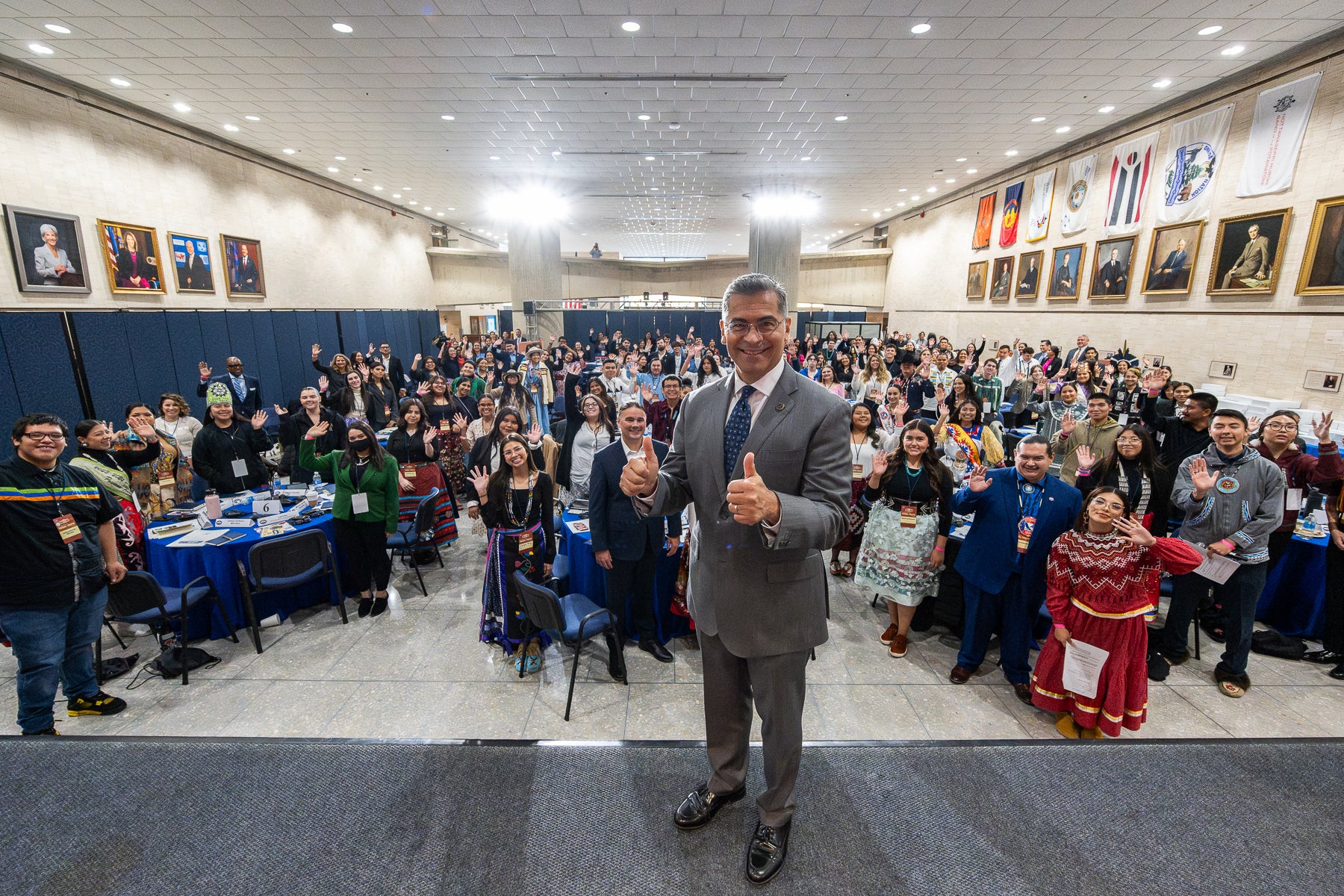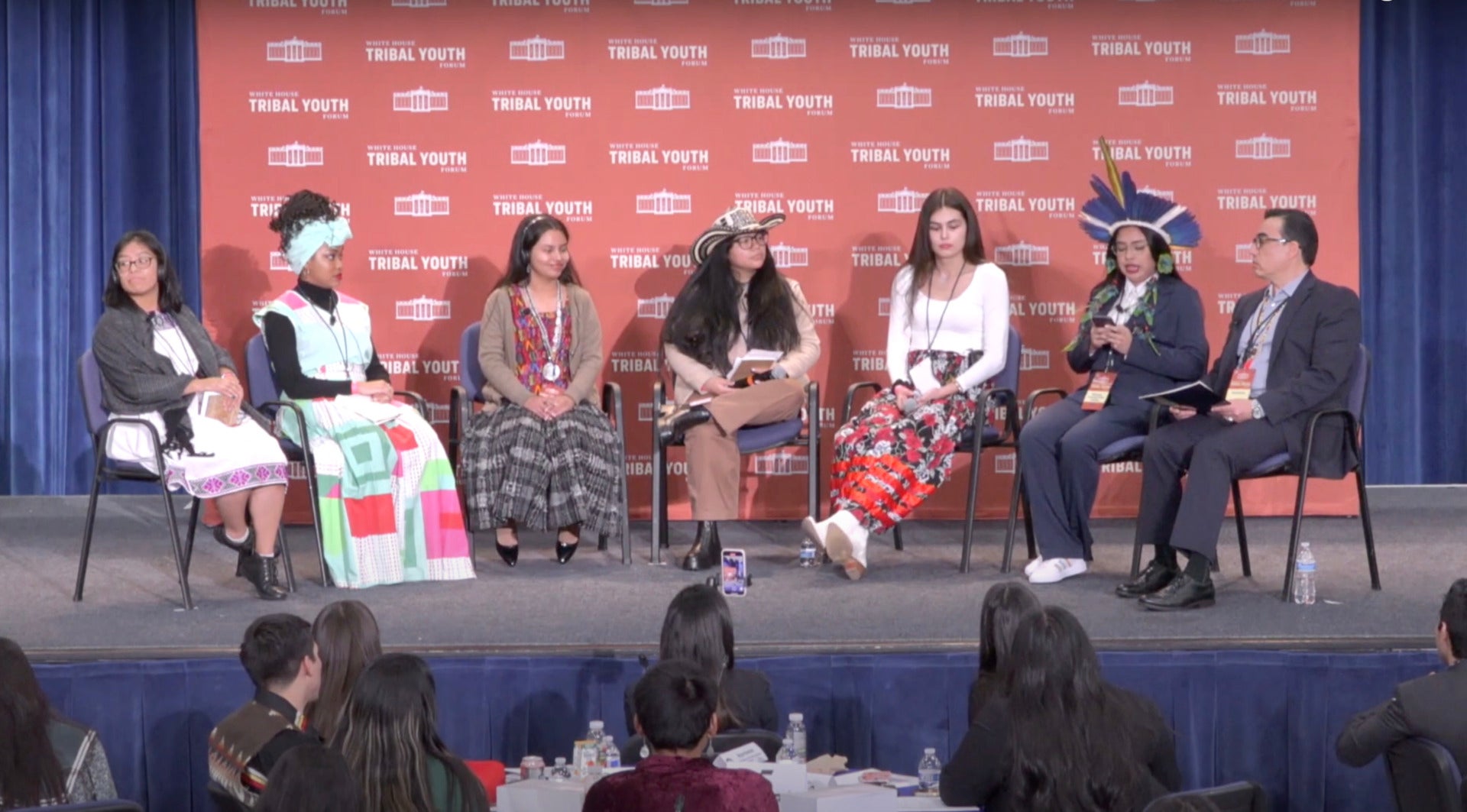November 6, 2023 — The Center for Native American Youth (CNAY), United National Indian Tribal Youth (UNITY) Inc, and the White House, were thrilled to host the third annual White House Tribal Youth Forum in Washington, DC to spur important dialogue around key policies and issues facing Native youth and their communities across the country.
The Forum kicked off with a welcome reception hosted at the National Museum of the American Indian. Native youth joined together to connect and enjoy performances from The Descendants (MHA Nation), Miracle Spotted Bear (Oglala Lakota), and Taboo (Shoshone and Hopi) of the Black Eyed Peas.
The next day, 123 Native youth from more than 50 tribal nations around the world came together at the Department of Health and Human Services for a day of panels, tabletop conversations, and cultural sharing.
Participants heard remarks from Senior Advisor and Assistant to the President and Director of the Office of Intergovernmental Affairs, Tom Perez, Secretary of the Interior, Deb Haaland (Laguna Pueblo), and Taboo.
“It’s young leaders like you who give me hope for the future. You are not just the leaders of tomorrow, you are the leaders of today. I may have broken some barriers but I want you to know I am leaving the ladder down behind me for all of you to climb, and I look forward to carrying you on my shoulders so you can accomplish your goals.” – Secretary Haaland
The first panel of the day, Protecting Our World: A Discussion on Climate Resiliency, was an engaging discussion between federal officials and Native youth leaders, who learned about the Biden-Harris Administration’s climate priorities and voiced their opinions on what has been done right along with areas for growth.
Youth moderators and panelists included: Bronson Azama (Kānaka Maoli, Hawaiʻi), Anagali (Shace) Duncan (Cherokee Nation), Avery Tilley (Cherokee Nation of Oklahoma) and Charitie Ropati (Yup’ik & Samoan). The panel also featured Assistant to the President and National Climate Advisor Ali Zaidi and White House Council on Environmental Quality Brenda Mallory.
Following the panel, Native youth attendees learned about opportunities for youth and careers in public servicefrom Assistant to the President and the Director of the White House Office of Presidential Personnel Gautum Rhagavan and Deputy Director of the U.S. Office of Personnel Management Rob Shriver.
They discussed the many paths that are available within the federal government, with Director Rhagavan highlighting how important it is to have a seat at the table.
“Government isn’t just some abstract thing out there. Decisions that are made here in this agency, in the White House, across all levels of government impact our communities. Particularly communities that aren’t well represented. “The work is deeply important, it reaches all of our communities. If we are not a part of it then we are going to be left out.”

U.S. Health and Human Services Secretary Xavier Becerra with attendees.
U.S. Health and Human Services Secretary Xavier Becerra also addressed attendees and echoed the importance of leadership and representation. .
“Someone is investing in you for a reason. Someone sees in you a leader that we must harness now. Someone who is a leader in Indian Country, where we need more and more voices to come forward,” Secretary Becerra said. “I hope what you will remember is that someone has identified you as being a future leader in this country.”
Later in the day, Native youth and federal officials engaged in a moving dialogue during Truth, Healing, & Reconciliation: Boarding Schools & the Indian Child Welfare Act. Throughout the panel they discussed the Federal Indian Boarding School Initiative, efforts to protect ICWA, and how both have impacted their communities and cultures.
Native youth moderators and panelists Mazie Countryman (Northern Arapaho, Navajo, Eastern Shoshone), Roxy Sprowl (Red Cliff Band of Lake Superior Chippewa Indians), and Tyler Star Comes Out (Lakota and Sahiyela) took the stage with Assistant Secretary-Indian Affairs Bryan Newland (Bay Mills Indian Community (Ojibway)), Administration for Native Americans Commissioner Patrice Kunesh (Standing Rock Lakota descent), and Indian Health Service Director Roselyn Tso (Navajo Nation).
“We all hold anger because of the things that have happened to us because…our family lines have been interrupted. Because our family lines have all faced some sort of removal, whether that’s boarding school or being adopted out and or moved even to urban areas,” said Roxy Sprowl. “So, how do anger and love work together in order to form healing? How do you heal while you still feel so angry? I think healing is a balancing act between anger, the pent-up anger, literally hundreds of years of anger, and hope at the same time. And I think both of those things, as well as love…could be really, really hard to juggle.”
Next, Indigenous relatives and advocates from around the world took the stage to discuss their struggles and hopes and the work they are doing for their communities. We were thrilled to have representatives from Mexico, Colombia, Brazil, Canada, Guatemala and Honduras join us in a cultural exchange!

The Movement is Medicine, Lessons Beyond the Field & Court Fireside Chat discussed the positive lessons that Native youth can learn from participating in sports.
The discussion included Silent Rain Espinoza (Viejas), professional softball player with USSSA Pride, Michael Linklater (Thunderchild First Nation), a retired Canadian basketball player, and Sam McCracken (Sioux and Assiniboine), General Manager for Nike N7. They were joined by youth moderator and panelist Shooter Stewart (MHA Nation).
“I remember one of my uncles saying to me, ‘Your culture is always going to be here for you, but…go pursue your passion and your dreams to play softball’,” said Silent Rain. “I know that my culture is always there for me, it’s always a part of me. So, when I go home, I get to experience that, but I also get to pursue my passion of playing pro-softball.”
In the final panel, Building Healthy Futures: A Conversation on Mental Health & Substance Prevention, attendees focused on addressing mental health and substance abuse in tribal communities and heard from Jalen Harvey (Navajo, Acoma Pueblo, Hopi), Shayla Tilsen-Lafferty (Oglala and Mni Coujou Lakota), and Jazmine Wildcat (Northern Arapaho), and federal officials Substance Abuse and Mental Health Services Administration (SAMHSA) Assistant Secretary for Mental Health and Substance Abuse Miriam Delphin-Rittmon and Assistant Director of the Office of Public Health, within the White House Office of National Drug Control Policy (ONDCP) Beth Connolly.
“We have the option to get on our phones and avoid these things. To really take that time and sit in silence, to get to know yourself,” said Shayla Tilsen-Lafferty. “Even the parts of yourself that are challenging or frustrating. Don’t be afraid to have grace with yourself.”
“Your mental health matters. Your self-care, if it makes you feel better then do it. That helps a lot,” Jalen Harvey said. “Whatever works best for you, keep on doing it. Don’t feel like you can’t express how you feel truthfully and honestly.”
“It’s really important that we do reach out, and that we are addressing folks’ needs where they are in their communities,: said Assistant Director Connolly. “It’s not cookie cutter, we’re not telling everyone that they have to be the same. Everyone needs different and culturally competent policies.”
To close out the event, Rose Petoskey (Grand Traverse Band of Ottawa and Chippewa Indians), Senior Advisor to the White House Office of Intergovernmental Affairs and Director of Tribal Affairs encouraged Native Youth to continue making a difference in their communities.
“I’ve worked hard to get to where I am, and I’m here to tell you that you can too…By being here today, you have uplifted your community. And I know you will continue to work hard. You have made your relatives and your ancestors proud,” said Petoskey.
The White House Tribal Youth Forum was made possible by our incredible and generous supporters, the Bezos Family Foundation, the W.K. Kellogg Foundation, Casey Family Programs, the Christensen Fund, Comcast/NBCUniversal, and Margaret A. Cargill Philanthropies.


 Democracy is Indigenous
Democracy is Indigenous